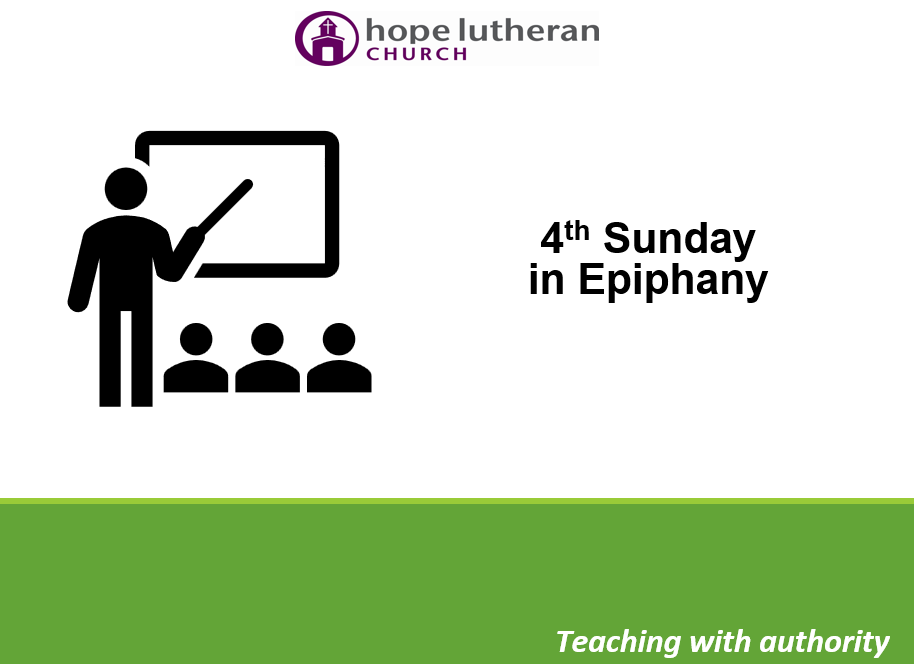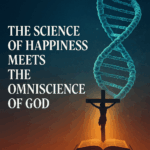
Text: Mark 1:21-28
Theme: Teaching with Authority
___________________________
Intr – The online world offers us regularly tons of cards and banners bringing virtual wisdom for our lives, especially when it comes to picture-based social media websites. It goes from advice on health, to spirit, to sadness, to purpose…and so on. Here are some examples:
_Nothing is wrong when it makes you happy;
_Stay away from toxic/unpleasant people;
_All that matters in life is how you see yourself;
_Honesty is the first chapter in the book of wisdom.
_Just be yourself;
Sometimes they are good phrases; sometimes just common sense. And many, many times, they are plain wrong statements. The fact is that when the real world seems unbearable, and we feel lost, we may hang onto any type of compass we find.
We may also look for any type of escape. In the past, options of escape included procrastination, sports, alcohol, or simply doing nothing. In the last 20 years though, our “doing nothing” has this addition – doing nothing online. We go online to get some relief, or just to escape real life. The problem with this option is that it often makes the line between right and wrong confusing and blurry. We start to read phrases, texts, advices, and they start to sink in becoming the truth in our hearts and minds, leading us to say, “I read it somewhere on the internet” which gives us that momentary feeling of comfort and assuredness that it must be something reliable to hold on to. And just as an extra note in case you are not an internet person, the same type of danger to faith lurks in TV shows, movies, magazines and even daily conversations outside of the realm of faith.
Real life seems to be unbearable sometimes, and it has been like this for centuries. In Palestine, 2,000 years ago it was no different. Then, as if the daily problems and struggles were not enough, the people of God were entangled in an almost unbearable religious practices as well. A whole section of traditions and practices which weighed on people, and smashed them – perhaps not onto the ground but against the rage of Yahweh(Lord), who was always prone and eager to punish the servants who weren’t close to perfection.
As we become aware of this scenario, we start to get a better understading of what it meant to that religiously anxious people to hear a Master like Jesus. He comes to the synagoge in Capernaum and not only attends Church – setting a good example for us – but also stands up and teaches His Jewish compatriots. What does St. Mark tell us then? “And they were astonished at His teaching, for he taught them as one who had authority, and not as the scribes.” (v.22).
Think about it for a moment. You are attending a Church where everytime you come you are mostly going through the motions. You hear severe and relentless preaching of law. Also, a bit of common sense and teachings of masters of old added to the Scripture. You learn that you are a bad servant, that you should behave better, that you are not as close to perfect as you should be. You have been falling short of the hundreds of precepts and laws you must obey in order to please God.[1] Lots of religiosity, not so much of religion – religare, Latin for “reconnection” with God.
Try now to figure out your reaction and how would you feel if a guy like that carpenter from Nazareth would come to town with His teaching. A teaching clearly and powerfully different from the religious leaders of the time. A teaching that was not just more of the same, like we scroll our screens down over dozens of “clever” phrases and/or legalistic impositions clothed as advice for life. Jesus was different from the scribes:
_In the teaching – not void traditions, but compassion and love.
_In the manner – St. Mark stresses this feature. I think we can figure it out well how a person more interested in passing traditions down would teach, as opposed to someone teaching spiritual doctrines with compassion and love.
_In authority – He was speaking from and for Himself. He was filled with the Holy Spirit. So we cannot discard here even a “Supernatural” effect of His words over His listeners which the scribes wouldn’t possess.
A little more about authority. “Here the evangelist Mark brings us a comparison: Jesus taught with authority but not like the scribes. What does authority mean here? We could imagine, how would Jesus speak in a synagogue? With authority, not prepotency. Authority, not arrogance. Whoever has genuine authority has also humility.
1 – Whoever has authority knows it well and has no need to prove it. Those who do not have authority usually to use other resources such as shouting to prove and impose their authority (This way usually leads to violence and fear). Jesus knew who he was. Jesus knew that he was the prophet foretold by Moses, that he was God’s anointed and beloved son. He was God himself in the form of man.
2 – Whoever has authority does not need the approval of others. Jesus was speaking the truth regardless of who is in front of Him. Jesus did not use the prophetic formula, as did Moses, “Thus saith the Lord”. The scribes used this resource also to recall the prophecies and also to recall the authority that was in themselves. But Jesus simply spoke and taught and did not use the words of others because he is the high prophet, he is God Himself. And he was not concerned with making friends, allies or receiving applause. He was not interested in whether they would approve or not. Jesus knows what he is saying, he knows who he is, and, of course, he knows all about all the topics.
3 –Whoever has authority can demonstrate it in a special way – Even the demons recognize the authority of Jesus and realize that he is the Holy One of God. Behind that irony and insinuations coming from that demonized body, Jesus perceives a person who suffers and who is possessed by an evil spirit. What does Jesus do? He silences the demon and expels it. Here we can learn that your best friend (the one who loves you and wishes you well) is not always the one who talks nice. Your worst enemy is the one who disguises himself as a friend and with nice and sweet things deceives you.
Jesus doesn’t need anyone’s approval so he did what he did, because he knew who he was and spoke with authority. He lived and did what he came to.” [2]
On top of that, Jesus is the authority that is not and can never get corrupted. Think about corruption in different authotiy levels and see how many facts and names pop up in your mind. It can be in politics, sports, companies, even inside the Church. In Jesus we find the only pure and perfect authority to which we can gladly submit.
Jesus used only God’s Words. He was not speaking for others, not just passing down letters and words. He was speaking from an intrinsic and self-evident authority. Because He was speaking only God’s Word. We know from the Bible what Jesus’ content and teaching was. It is way beyond any human wisdom can teach us.[3]
Jesus taught with authority about
Grace / _Forgiveness /_Salvation / Care /
True Religion – reconnection with Him by faith.
Mark makes it clear why Jesus left many marvelled, astonished beyond words. The content of His teaching. The authority of His Words. And especially, the way He taught them. Jesus heals the man who was possessed by a demon, but people were amazed by his teaching, and then his exorcism. In your life, don’t be discouraged if you don’t see “Miracles” happening all the time. Through the Word, through the Sacrament, His power and authority are still there. Salvation is there. As are also Consolation and strength. Remember: Jesus keeps healing you from the devil, from sin and the devil’s works. He cares about you. Through repentance and faith you are daily, weekly healed from sin, and brought to His presence covered in Christ’s righteousness.
Still, as we mentioned in the beginning, sometimes we want to run away and hide in supposedly “safe places” when we are hurt and sad. The danger comes when we take any advice from the wrong places, especially as we live in a world surrounded by influences and influencers. This is why we need all the more the teaching that comes from Jesus to sift things through the widsom that comes from his word. In Him we have the teaching with authority and the wisdom with love to avoid falling prey of common sense, using his word to see the World. As we can do for example with the the sentences from the beginning of the sermon:
_”Nothing is wrong when it makes you happy”. Wrong. Nothing is wrong if is not…wrong. We can easily be happy doing things that are not right. Happiness comes from holding fast to God’s principles in His Word.
_”Stay away from toxic/unpleasant people” – that holds true when risk of violence and harm are involved. But this is often used to justify walking away from people who need us and our faith active in love for them.
_“All that matters in life is how you see yourself;” Actually, what matters most is how God sees you. Because it is very easy for you to create a wrong image of yourself, whether too good or too bad. As you learn how God sees, then you can look to yourself in a more precise and clear way.
_”honesty is the first chapter in the book of wisdom”; As we learn from Psalm 111: Trusting and fearing the Lord is the beginning of wisdom.
_”just be yourself” [4] – This sounds good when it comes to avoid living a fake life. However, Paul moves us away from ourselves in 1 Corinthians: “I became all things to all people”. Christians are invited not just to be themselves, but to become all things to other people for the sake of the Gospel.
Cc – Jesus teaches you. With authority. With love. Take this teaching to heart. Live this teaching in your life. Share this teaching with people in our social interactions, networks and relationships. Whether in the virtual world or in real life.
_______________________________________
[1] In Jesus’ day, many non-biblical traditions had become part and parcel of Judaism, and the number of laws, or commandments, in the Law of Moses, which numbered 613, according to one tradition, had increased significantly to perhaps thousands! Some of these “new” commandments had a clear and non-controversial basis is scriptures; others did not. Evangelist Mark commented on some of the accretions of tradition which had attached themselves to some of the original 613 commandments contained in the Torah. “The Pharisees and some of the scribes gathered around [Jesus] when they had come from Jerusalem, and had seen that some of His disciples were eating their bread with impure hands, that is, unwashed. (For the Pharisees and all the Jews do not eat unless they carefully wash their hands, thus observing the traditions of the elders; and when they come from the market place, they do not eat unless they cleanse themselves; and there are many other things which they have received in order to observe, such as the washing of cups and pitchers and copper pots” (Mark 7:1-4 NIV).In a subsequent verse, Jesus remarked in the Pharisees’ hearing, “‘You have let go of the commands of God and are holding on to the traditions of men” (Mark 7:8 NIV). Source: https://hermeneutics.stackexchange.com/questions/8350/how-did-jesus-teaching-with-authority-differ-from-the-scribes
[2] BRUM, Paulo. “A prophet among brothers”. Sermon for January 31st, 2021. “When you know and feel deeply loved by God you know who you are, and you don’t need anything else. And you will realize by faith that the same love that God has for you he also has for your brother and sister – your neighbour. So, we can go and respect, love and serve others. When you don’t feel loved, the tendency is to hurt or want the love of others at any cost. When you are loved you feel free to serve and love as well.”
[3] We can use the Lectionary for today to draw some of His content.
Deuteronomy 18 – Yahweh tells the people of God that a new prophet would come. Jesus. The interesting thing here is that even though He spoke only the Word of God, Jesus died anyways.
Psalm 111 – Before going back to Heaven, Jesus explained to his disciples what was written about Him in Moses, in the Prophets, and in the book of Psalms – confirming thus that the OT is God’s Word. Let’s listen to Psalm 111. Listen to it and connect to Jesus in the synagoge: “Great are the works of the Lord, studied by all who delight in them. Full of splendor and majesty is his work, and his righteousness endures forever. He has caused his wondrous works to be remembered; the Lord is gracious and merciful. The works of his hands are faithful and just; all his precepts are trustworthy; He sent redemption to his people.”
1 Corinthians 8 – from today’s epistle we learn that acting by faith as God’s children through Christ we will love our brothers and sisters, especially the weakest, showing them the teaching and healing of Christ for their life.
[4] From an idea by Peter Nafzger in: “Concordia Theology Podcast, Lectionary kick-start”, Fourth Sunday in Epiphany.” Available at https://scholar.csl.edu/lks/37/ Accessed: Jan 26, 2024.








